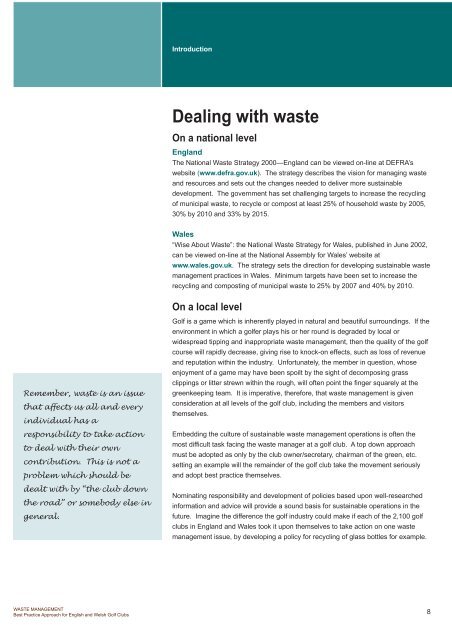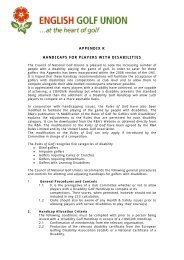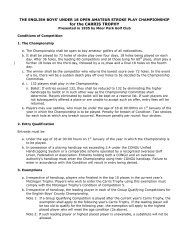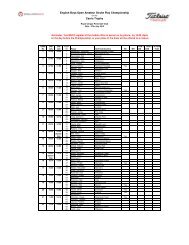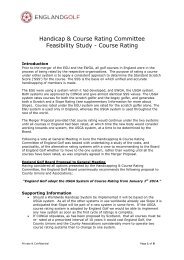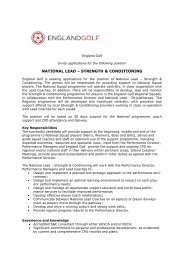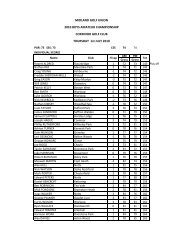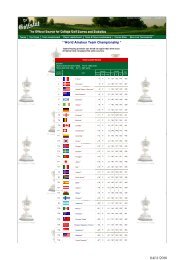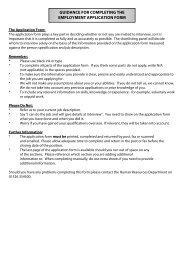Waste management - England Golf
Waste management - England Golf
Waste management - England Golf
Create successful ePaper yourself
Turn your PDF publications into a flip-book with our unique Google optimized e-Paper software.
Introduction<br />
Dealing with waste<br />
On a national level<br />
<strong>England</strong><br />
The National <strong>Waste</strong> Strategy 2000—<strong>England</strong> can be viewed on-line at DEFRA’s<br />
website (www.defra.gov.uk). The strategy describes the vision for managing waste<br />
and resources and sets out the changes needed to deliver more sustainable<br />
development. The government has set challenging targets to increase the recycling<br />
of municipal waste, to recycle or compost at least 25% of household waste by 2005,<br />
30% by 2010 and 33% by 2015.<br />
Wales<br />
“Wise About <strong>Waste</strong>”: the National <strong>Waste</strong> Strategy for Wales, published in June 2002,<br />
can be viewed on-line at the National Assembly for Wales’ website at<br />
www.wales.gov.uk. The strategy sets the direction for developing sustainable waste<br />
<strong>management</strong> practices in Wales. Minimum targets have been set to increase the<br />
recycling and composting of municipal waste to 25% by 2007 and 40% by 2010.<br />
On a local level<br />
Remember, waste is an issue<br />
that affects us all and every<br />
individual has a<br />
responsibility to take action<br />
to deal with their own<br />
contribution. This is not a<br />
problem which should be<br />
dealt with by “the club down<br />
the road” or somebody else in<br />
general.<br />
<strong>Golf</strong> is a game which is inherently played in natural and beautiful surroundings. If the<br />
environment in which a golfer plays his or her round is degraded by local or<br />
widespread tipping and inappropriate waste <strong>management</strong>, then the quality of the golf<br />
course will rapidly decrease, giving rise to knock-on effects, such as loss of revenue<br />
and reputation within the industry. Unfortunately, the member in question, whose<br />
enjoyment of a game may have been spoilt by the sight of decomposing grass<br />
clippings or litter strewn within the rough, will often point the finger squarely at the<br />
greenkeeping team. It is imperative, therefore, that waste <strong>management</strong> is given<br />
consideration at all levels of the golf club, including the members and visitors<br />
themselves.<br />
Embedding the culture of sustainable waste <strong>management</strong> operations is often the<br />
most difficult task facing the waste manager at a golf club. A top down approach<br />
must be adopted as only by the club owner/secretary, chairman of the green, etc.<br />
setting an example will the remainder of the golf club take the movement seriously<br />
and adopt best practice themselves.<br />
Nominating responsibility and development of policies based upon well-researched<br />
information and advice will provide a sound basis for sustainable operations in the<br />
future. Imagine the difference the golf industry could make if each of the 2,100 golf<br />
clubs in <strong>England</strong> and Wales took it upon themselves to take action on one waste<br />
<strong>management</strong> issue, by developing a policy for recycling of glass bottles for example.<br />
WASTE MANAGEMENT<br />
Best Practice Approach for English and Welsh <strong>Golf</strong> Clubs<br />
8


